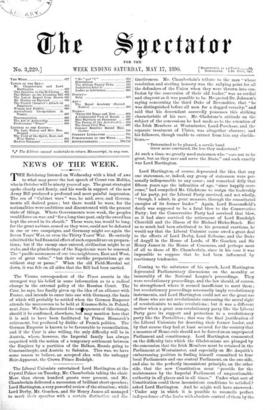Coming to the substance of his speech, Lord Hartington deprecated
Parliamentary discussions on the morality or immorality of the National League's proceedings. They were revolutionary proceedings, and the law should, of course, be strengthened where it seemed insufficient to meet them ; but revolutionary proceedings necessarily imply revolutionary instruments, and Lord Hartington could not see the great use of those who are not revolutionists canvassing the moral right of revolutionists to make revolutions ; but it was a different matter when a great non-revolutionary party like the Liberal Party gave its support and protection to a revolutionary party like the Parnellites ; that was the final justification of the Liberal Unionists for deserting their former leader, and by that course they had at least secured for the country that a measure of Home-rule should not be forced on an unprepared Parliament and constituency. Lord Hartington commented on the difficulty into which the Gladstonians are plunged by the concession that the Irish Members must be retained in the Parliament at Westminster, and especially on Mr. Asquith's embarrassing position in finding himself committed to four local Parliaments and one central Parliament, on the one side, and also to the perfectly inconsistent principle, on the other side, that the new Constitution must "provide for the maintenance by the Imperial Parliament of unquestionable authority in all places and in all times." Under what sort of Constitution could these inconsistent conditions be satisfied ? asked Lord Hartington. And he might well have answered ; Under any in which it is possible to reconcile perfect independence ofthe limbs with absolute control of them by the
mind.' Lord Hartbigton did not admire the new Radicalism. But admirable or not, he thought that if it was to be tried at all, it should be tried by men who had real faith in it ; and he evidently did not believe that that faith was seriously reposed in it by the chief members of the Liberal Party.







































